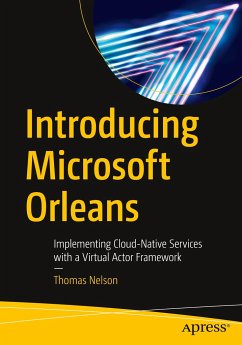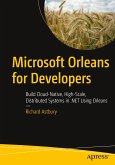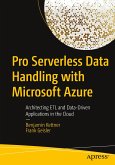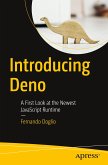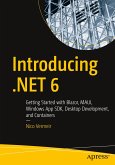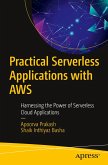Welcome to Orleans, a virtual actor framework from Microsoft that allows a single developer to create immensely scalable, available applications while maintaining a high throughput. This guide is designed to give you a foundational understanding of Orleans, an overview of its implementations, and plenty of hands-on coding experience. Side-by-side monolithic and microservice patterns alongside Orleans' framework features are also discussed, to help readers without an actor model background understand how they can enhance applications.
Author Nelson's approach is to introduce patterns as needed for business requirements, including monolithic microservices and to convert monolithic to microservices, in order to keep a microservice from growing into a monolithic application. Orleans is a good choice for either of these scenarios as the next step to build your backend services and reduce unnecessary orchestration, overhead, and tooling.
The Orleans framework was designed to handle tedious overhead, allowing the developer to focus on the solution. You will learn how Orleans can support billions of virtually parallel transactions while sustaining low latency and high availability. In addition, you will glimpse under the hood at Orleans to discover its useful attributes. All key learning points include hands-on coding examples to reinforce understanding.
This book goes beyond what Orleans is to explain where it fits within the realm of development. You will gain an in-depth understanding to build a foundation for future growth.
What You Will Learn
Understand how Orleans can benefit your monolithic and/or microservice applicationsGain a brief overview of actor models and how they relate to OrleansObserve the design patterns and how Orleans can simplify or reduce tooling requirementsKnow the pros and cons of microservices and Orleans to determine the best course of action based on the needs of an applicationDiscover Orleans' design patterns and practices, including life cycle, messaging guarantees, cluster management, streams, load balancing, and moreBuild your first Orleans' application; build base knowledge of application structure, unit testing, dashboard, scheduled events
Who This Book Is For
This book is for developers. A basic understanding of .NET development and an understanding of service concepts is helpful. Readers will need a connection to download Nuget packages and a code editor (Community Edition Visual Studio or VS Code).
Author Nelson's approach is to introduce patterns as needed for business requirements, including monolithic microservices and to convert monolithic to microservices, in order to keep a microservice from growing into a monolithic application. Orleans is a good choice for either of these scenarios as the next step to build your backend services and reduce unnecessary orchestration, overhead, and tooling.
The Orleans framework was designed to handle tedious overhead, allowing the developer to focus on the solution. You will learn how Orleans can support billions of virtually parallel transactions while sustaining low latency and high availability. In addition, you will glimpse under the hood at Orleans to discover its useful attributes. All key learning points include hands-on coding examples to reinforce understanding.
This book goes beyond what Orleans is to explain where it fits within the realm of development. You will gain an in-depth understanding to build a foundation for future growth.
What You Will Learn
Understand how Orleans can benefit your monolithic and/or microservice applicationsGain a brief overview of actor models and how they relate to OrleansObserve the design patterns and how Orleans can simplify or reduce tooling requirementsKnow the pros and cons of microservices and Orleans to determine the best course of action based on the needs of an applicationDiscover Orleans' design patterns and practices, including life cycle, messaging guarantees, cluster management, streams, load balancing, and moreBuild your first Orleans' application; build base knowledge of application structure, unit testing, dashboard, scheduled events
Who This Book Is For
This book is for developers. A basic understanding of .NET development and an understanding of service concepts is helpful. Readers will need a connection to download Nuget packages and a code editor (Community Edition Visual Studio or VS Code).

